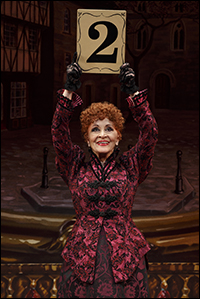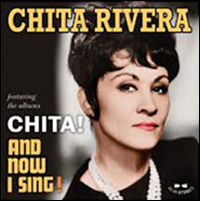
*
The Mystery of Edwin Drood [DRG]
I found The Mystery of Edwin Drood — Rupert Holmes' fanciful adaptation of Charles Dickens' final, unfinished novel — exuberantly refreshing when I first encountered it on a balmy August evening in 1985 at the Delacorte in Central Park. I found it slightly more polished but less brilliant that December, indoors at the Imperial. A quarter of a century later, the show returned to town last November. This time around, I found the show — extended through March 10, at Studio 54 — enjoyable and satisfactorily entertaining, which is a far cry from my enthusiastic visits in 1985.
Is this caused by the "repeated visit syndrome," which holds that delightful surprises will seem less delightful and less surprising with each viewing? Perhaps, although I am typically not prone to this malady. I've recently paid numerous visits to One Man, Two Guvnors; The Book of Mormon and Once, with no diminishment whatsoever. Although it could be that Drood is more dependent on gimmicks, which once revealed lose their luster.
A second possibility has to do with the level of performance and performers. The original production was thoroughly sparkling. Joe Papp and his Shakespeare Festival had struck gold in 1980 with a swashbuckling, new-style production of Gilbert & Sullivan's The Pirates of Penzance, which similarly coursed from the Delacorte to Broadway and left no audience-member without a broad smile. While Penzance and Drood were quite different in any manner of ways, the latter seemed infused with the same exhilaration of the former due to the presence of the same director and choreographer (respectively Wilford Leach and Graciela Daniele). Scott Ellis and Warren Carlyle have done a winning job with the new Roundabout edition, but it never quite seems to rise to the heights of the original.
The same can be said for the performers. Jim Norton (as the munificent Chairman), Will Chase (as the overwrought John Jasper), Jessie Mueller (as the mysterious Helena Landless), and Andy Karl (as the hotheaded Neville Landless) stand out, among a generally fine group. But for me, the original performers — George Rose (Chairman), Patti Cohenour (Rosa Bud), Howard McGillin (Jasper), Cleo Laine (Princess Puffer), and Betty Buckley (Edwin Drood) — inhabited their characters in a manner that this new cast doesn't, not in this production. Visit PlaybillStore.com to view theatre-related recordings for sale.
| |
 |
|
| Chita Rivera in the current revival. | ||
| Photo by Joan Marcus |
My guess, though, is that it is not the performances in the revival — or the staging, or simple overfamiliarity — that caused the new Drood to diminish before my ears. It is the score, and I can thank the new CD for helping clarify this. Mr. Holmes did a neat job of turning Dickens into a contemporary Broadway musical circa 1985, and he was justly rewarded. But the strength of Drood, for me, always fell to a handful of numbers: "Moonfall," "Both Sides of the Coin," "Off to the Races," and "Don't Quit While You're Ahead." Those were the highlights when at the Delacorte, the Imperial, and now at Studio 54. Most of the other songs seem to belong in the merely-functional range, offering lots of bounce and a good deal of flavor but not all that much more.
This didn't bother me much in 1985, when Leach and Daniele were pulling the strings (and when Cohenor, McGillin, Laine, Buckley and especially Mr. Rose were chewing on each word like savory pasties). At the Roundabout, though, the secondary songs seem to have thoroughly lost their bite; once we get the point — which usually happens pretty quickly — I'm ready to move on. The new CD, I'm afraid, makes this exceedingly clear. After two hearings, I was more than ready to quickly skip through to the handful of favorites.
This was further pointed up by the decision to include the many alternate solutions to the plot on this 2-CD set. Since Dickens died without revealing the solution to the mystery, Holmes came up with the canny idea to have the audience vote every night. This is mighty effective in the theatre; no matter who wins, they have a solo ready to sing. Hearing them all, one after another, somehow makes Holmes' accomplishment seem less impressive; we see the glue with which the author has snipped and snapped and pasted bits of melody and lyric to fit all the characters. After a while of this, my reaction was simply: OK, I have seen the writing on the wall — to quote one of Mr. H's songtitles — but must I listen to the rest of it?
Visit PlaybillStore.com to view theatre-related recordings for sale.
| |
 |
|
| Original album art | ||
The same Chita Rivera who is kicking up her heels in the current Drood — and who recently sparked Rob Fisher's excellent Kander & Ebb celebration as part of Lincoln Center's American Songbook series (and telecast on "Live From Lincoln Center") — has now appeared with a solo CD. A new CD, although the long-out-of-print album is 50 years old.
Two albums, actually. "Chita!" was released by the U.K. label Philips in 1962, during the London run of Bye Bye Birdie. (Rivera had by that point starred in West Side Story and Birdie on both Broadway and the West End.) Back in New York later that year, she recorded "And Now I Sing!" for the independent SEECO label. Both — 23 tracks in all — are combined on this new CD.
It took a bit of listening to get a handle on "Chita!," a collection of mostly show tunes. It wasn't until midway through that I realized that they were purposely showing us the many sides of Rivera. "Ten Cents a Dance" is an interesting take — in a way forecasting the yet-to-be-written Sweet Charity — while "The Lady's in Love with You" is kittenish. Then comes "Love, Look Away," from Flower Drum Song. Not what we'd expect to hear from that Wild Spanish/Puerto Rican rose, but one of the nicest recordings of the R & H ballad I've heard.
By the time she gets to "Get Me to the Church on Time," it has become clear; Chita is out to show us her wide range, and have fun doing so. ("Pull out the stoppa, let's have a whoppa.") Alyn Ainsworth — conductor of the West End Birdie — conducted and provided the sometimes overdone arrangements. They achieve what they presumably set out to do: give us a well-rounded survey of the talents of Rivera. "And Now I Sing," conducted and arranged by Joe Cain, is friskier and more American; while recorded only months later, we get a more clearly recognizable Chita. No show tunes here; just movie songs, mostly from the '30s and '40s (although they include the then brand-new "Moon River").
True, some of the arrangements — on both of the included albums — are too much stuck in their own era. But then you get something like a tango hall arrangement of Rodgers & Hart's "Easy to Remember" — a Bing Crosby song, originally — and you have to smile broadly at song, arrangement and singer. Chita's many fans should be pleased.
(Steven Suskin is author of "Show Tunes," "The Sound of Broadway Music: A Book of Orchestrators and Orchestrations," "Second Act Trouble," the "Broadway Yearbook" series and the "Opening Night on Broadway" books. He also pens Playbill.com's Book Shelf and DVD Shelf columns. He can be reached at [email protected].)
Visit PlaybillStore.com to view theatre-related recordings for sale.









